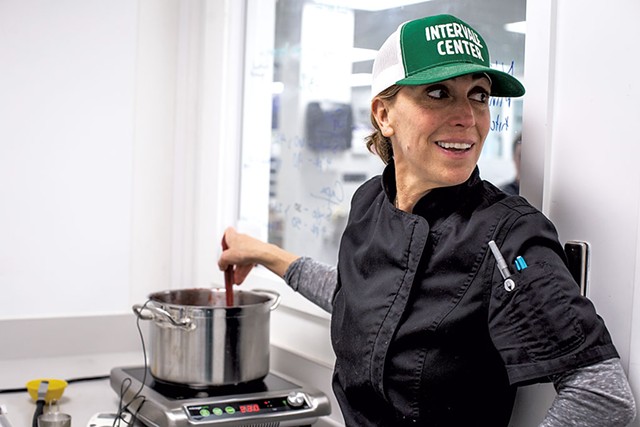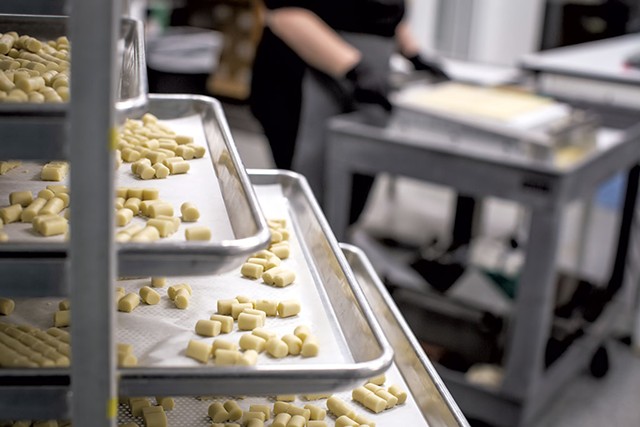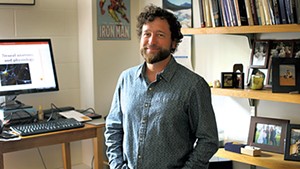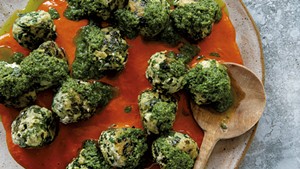
- Luke Awtry
- Amy Bacon
Amy Bacon cradles a large square slab of gelled strawberry purée and sets it on a machine called a guitar cutter. The cutter has a base of tines that hold the slab in place. Bacon pulls down a lever, and rows of taut wires slice through the slab, creating a musical hum when they vibrate against the tines, like the strum of a guitar. Then she turns the slab 90 degrees and cuts through it again. The result: cubes that will be coated with sugar crystals and divided into packages of 20.
Each of these sugar-coated cubes is infused with 5 milligrams of THC — tetrahydrocannabinol, the psychoactive compound found in cannabis.
Bacon, 48, describes this delicacy by its French name, pâte de fruits. But the patients who purchase the fruity cubes from Champlain Valley Dispensary's stores in Burlington and South Burlington, or the company's Southern Vermont Wellness branches in Middlebury and Brattleboro, know them more modestly as "gummies."
No matter the name, these sour strawberry treats — made with a pectin-based purée, rather than cheaper gelatin found in many similar candies — demonstrate Bacon's efforts to make medical marijuana not just edible but appetizing. These aren't your garden-variety pot brownies. If someone's using a guitar cutter to cube gummies, they're trafficking in high-quality confections.
Bacon, a culinary-school-trained chef who once worked for revered restaurateur Alice Waters, now parlays those expert cooking skills into edibles and other products for the dispensary. As CVD's production manager, she concocts cookies, brownies, candies, beverages, tinctures and salves as the delectable delivery systems for the therapeutic properties of THC.
And she can't taste any of it.
Under strict state regulations, the dispensary cannot divert any of its products — even to those who make them — outside of its tightly restricted sales outlets. CVD must account for every drop of THC it uses. And dispensary workers can't buy the product to try themselves unless they have a medical marijuana card registered with the state.
The company's CBD products, however, are an exception. These are made with cannabidiol, a compound extracted from the hemp plant that doesn't make people high. Bacon oversees those, too, under CVD's Ceres Natural Remedies brand, which is sold to the general public.
Medical marijuana is just that: medicine. But Bacon believes even medicine should be delicious.
"They deserve to have good food put into their body that tastes good," she says of medical marijuana patients, many of whom use the drug to ease pain or discomfort. "If this little strawberry pâte de fruits makes their day, I'm happy about it."
Bacon focuses on flavor and, along with her handful of employees, crafts CVD's entire menu by hand, without automation. To perfect each recipe, she does taste her confections — but samples them before adding THC. And she uses local and organic ingredients whenever possible. For instance, a new line of little square crackers called Cheese Nibs contains the Cellars at Jasper Hill Farm's Cabot Clothbound cheddar, one of Vermont's most awarded — and most expensive — cheeses. Bacon says she tried other cheddars but found them not up to snuff.
She uses Callebaut chocolate from Belgium in the gluten-free brownies and Deep Mountain Maple syrup from Vermont for maple-flavored lozenges and maple fudge, an early spring special. For the bases of CVD's apothecary products, such as salves, Bacon stirs up a stock of organic herbs, including arnica flower and chamomile, into a coconut oil base.
Once she has perfected a base recipe, Bacon works to ensure that each product contains a precise amount of THC or CBD. For example, each 8-gram sea-salt caramel contains exactly 10 milligrams of THC.
"Amy's job, in a nutshell, is to create recipes that have distributed cannabinoids evenly across the batch, with consistent formulation," says CVD director of marketing Bridget Conry.
Bacon isn't allowed to discuss how she achieves uniform THC distribution in her products, even in general terms. CVD keeps a tight lid on her process, which it considers proprietary, Conry says.

- Luke Awtry
- Micromints
Bacon's efforts, however, are evident to Tammy Long. She's an ovarian cancer survivor who lives in South Londonderry and has consumed CVD's edibles for more than four years. Long's go-to is the ginger molasses cookie, which she says has a nice flavor and, more importantly, gives her a reliable dose of THC every time.
"The consistency has been pretty spot-on," Long says. "I know what to expect in terms of getting high."
Bacon is a Colchester native and credits her mother — whom she describes as an "incredible" cook — with instilling her love of good food. After graduating from the University of Vermont with an English degree, Bacon followed her passion for cooking to the California Culinary Academy in San Francisco. From there, she got a kitchen job at Waters' Berkeley restaurant, Chez Panisse, where she stayed for three years.
When Bacon became pregnant with her first daughter, she and her husband, Tom, returned to Vermont. They settled in her hometown to raise a family, which now includes three children. Bacon went into private catering, doing her own gigs and occasionally picking up work with other caterers. But something was missing.
"I love working with food, but I also have this need to help people," she explains, noting that her mother and sister are both nurses. "I was looking for a little bit more meaning in my work, a little bit more of a connection."
Her husband's connection to CVD founder and executive director Shayne Lynn led Bacon to the dispensary and its then-nascent edibles program in December 2014.
At the time, Conry oversaw the company's kitchen — essentially just a Crock-Pot and a convection toaster oven on a table in the CVD offices, she recalls. But demand for edibles was growing, and Conry needed someone else to handle production. Bacon knew nothing about edibles or THC infusion, but she had plenty of experience with food and how to prepare it for others. She and Conry soon equipped the infusion kitchen at CVD's production facility in Milton with top-notch appliances, including the guitar cutter.
"Amy brought in the professional skills that were necessary to run a commercial kitchen," Conry says. "You don't need to know the cannabis part to work in the cannabis industry. You need to have the right professional skills coming in. We'll teach you the cannabis part, or we'll learn it together."
Bacon says she leans toward the savory side of cooking, but at CVD she has grown proficient at sweets. Fats and sugars are ideal for binding to cannabinoids, she explains, and cookies and candies seem to have the most appeal to medical marijuana users.
Today, Bacon's work involves as much of the scientific as the sensory. Most of her edibles use what the company calls "activated oils" that carry THC. Extracted from the plants in CVD's nursery using a high-tech carbon dioxide method, the oils vary from thin and viscous to dense and jam-like.
Bacon chooses the oil for each recipe after determining how it will distribute through the batter or dough. Then it's all about the math. She knows the weight of each candy or cookie and the amount of THC it should contain. Bacon multiplies that number of milligrams times the number of items in the batch to calculate the total amount of THC she needs. Then she looks at the concentration of THC in the oil, which tells her how much she'll need for the whole batch.
She sometimes uses heat or other means to manipulate the oil and ease its even spread through the mixture. "You can't just pour it in," she says.
Precision is key. That's true of baking in general, but in most commercial kitchens the baker doesn't have to record the exact weight of the sugar she uses in a binder notebook — as Bacon does for THC — before dumping it into the mixer. She doesn't have to ensure that the exact same number of granules of sugar end up in each cookie. (And, of course, in any other kitchen a baker would not only be allowed to taste the final product but would be required to do so to ensure it turned out as intended.)
A CVD inventory employee must sign out each jar of activated oil that Bacon uses and, when she returns it, register the difference in weight to match it against the amount Bacon recorded having put into the recipe. When the items are finished and packaged, she writes the total weight of the package and the percentage of THC it contains on a different ledger.
All of the math, documentation and repetition in the CVD production kitchen can get tedious, Bacon admits.
"That's when you put the patients in front of your brain," she says. "It's going to make someone's day better."
















Comments
Comments are closed.
From 2014-2020, Seven Days allowed readers to comment on all stories posted on our website. While we've appreciated the suggestions and insights, right now Seven Days is prioritizing our core mission — producing high-quality, responsible local journalism — over moderating online debates between readers.
To criticize, correct or praise our reporting, please send us a letter to the editor or send us a tip. We’ll check it out and report the results.
Online comments may return when we have better tech tools for managing them. Thanks for reading.